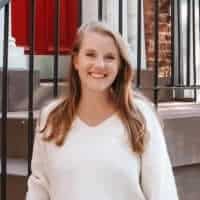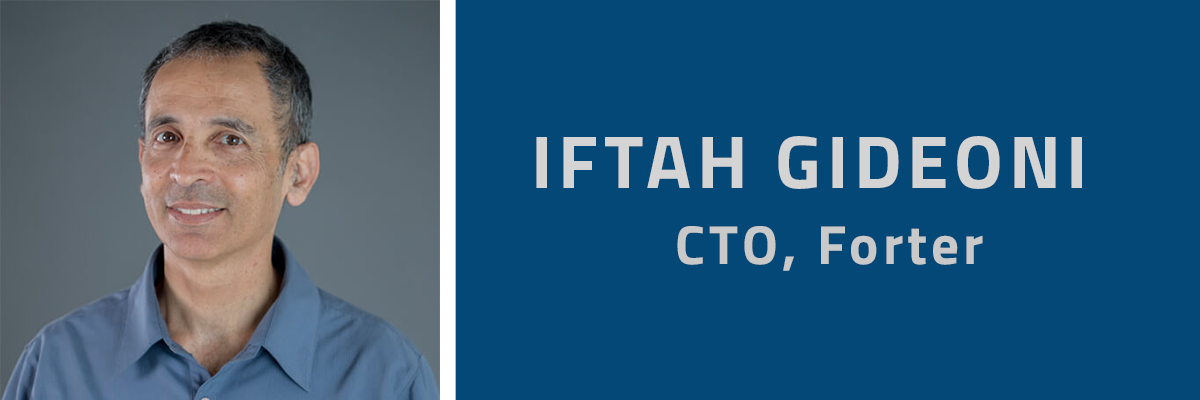The Financial Technology Report recently announced their inaugural awards for The Top 25 Financial Technology CTOs of 2019. Forter’s very own CTO Iftah Gideoni was amongst the prestigious individuals awarded this prize. As such, we wanted to take an inside look at what makes our CTO tick, understand his challenges, his motivations, and his vision for Forter and the future of technology in the field.
As CTO at Forter, Iftah brings his experience in R&D Management, machine learning and data management for internet scale environments to the challenge of fraud prevention. In the past he served as VP R&D and CTO of BVR System (Nasdaq:BVRS), and co-founded and CTO’ed a company focused on distributed intelligence in unmanned vehicles. Later, he served at the CSIRO, leading the National Security research portfolio to success, turning aerospace and automation technologies into investable spin-offs.
After returning to Israel, he became Chief Data Scientist, VP R&D and Chief Data Officer at myThings.com. As part of his role as the CTO of Forter, he draws on all of this experience to lead the creation of scalable architecture for an advanced data management solution which emulates the smartest fraud analysts, in real-time and at scale. An ex-military pilot, Iftah holds a B.Sc. (Physics) with distinction from Tel Aviv University, and a M.Sc. from the University of British Columbia (Vancouver, Canada) investigating inference and decisions under uncertainty.
This initial interview only scratches the surface of my conversation with our incredibly impressive and accomplished CTO. As such, this will be the first in a short series that we will be publishing featuring the man himself.
1) Tell us a little about your background. How does a trained physicist find himself in the fraud prevention industry?
Though I was in school for Physics, my Masters was in the area of inference and decisions under uncertainty. Throughout my career, I have been working and developing companies where the ability to infer and decide, under conditions of uncertainty formed the cornerstone of the value that these companies delivered. While my days working in a nuclear accelerator have come to an end (I did that in the early 90’s), what I’ve done since then, including during my academic research, is focus on how rational agents need to make decisions when given the evidence brought before them. So, as you can see the leap from physics to fraud prevention was more of a dotted line.
2) What first caught your interest in Forter and ultimately convinced you that this was a company you needed to be a part of?
I joined Forter nearly five and a half years ago, in early 2014. There were two aspects of the initial stages of Forter that truly caught my eye. The first, was that we enable the ability to trust people without needing to prompt them to provide their identity. This is a big thing. Unlike common Consumer Identity Access Management (CIAM) that requires users to on-board (whether through high friction experiences or low-touch ones), we make decisions and allow transactions to take place, even when we’ve never seen this person before and they log in as a guest to a particular platform. Forter provides trust, and that is truly the backbone of the vision and technology. The ability to provide and guarantee trust decisions that will ultimately allow us to trust people on the internet, with or without established identity – this is what really caught my attention when coming to Forter.
The second aspect was the very rare opportunity to join three young founders that were unique in the fact that firstly, their vision was highly technical – the idea that everything could and would be fully automated and real time from Day 1 was unprecedented – and secondly, that all three of our Founders truly are subject matter and domain experts. They know the ins and outs of online payment fraud better than anyone else.
The combination of these two aspects, compounded by the fact that I would be joining the very beginning stages of the company, building the foundation of both the R&D stack, architecture, people and the culture of the organization, was very exciting to me.
3) Tell us a bit about what you currently do, how you define the role of CTO at Forter.
My role is to create, support, and manage all technological and offering aspects, advancing them to drive a fast growing and sustainable business. A sustainable growth means my role is far from being limited to the Product roadmap, SaaS system and technology, but similarly to the creation of a healthy organization with happy people, that are able to implement and execute complex flows. This I do mainly through the individuals we have as heads and VPs of Engineering, Product, Precision, Innovation Lab, and Research. As Forter has grown, it has been vital that the culture we built as a baseline from our initial hires grows with us, and is able to support our vision for the long haul.
4) What most inspires or motivates you to come into work each day?
I would say there are four main aspects that motivate me.
One. The problem we solve is extremely interesting and dynamic.
Two. The true barrier to entry that we create is technology and inference related, not necessarily based on sales or marketing operations (at least initially).
Three. It may sound cliché, but we work with wonderful people. Many of our folks come to us from intelligence units which prepare them to be: technically equipped, inspire them to have a “can do” attitude, and ensure they have an utter contempt for authority. This I mean in the best way possible, they are curious and inquisitive, and are never afraid to question authority. It is one of the aspects that keeps fresh ideas and innovation constant in our halls. Additionally, we have people that come from all walks of life. From clinical psychologists, to linguistic experts, lawyers, or those from the behavioral sciences, we have an extremely interesting bunch of people with a variety of skills to offer our company and technology.
Four. I believe that we are just in the beginning of the journey with respect to what can be done with trust that is not necessarily, not always, and dynamically based on hard proofing identity.
5) What makes Forter’s technology unique or differentiated in the market?
Forter is unique in a number of areas, but most acutely this is how I would categorize them:
Our mode of operations. Our analyst research and leverage domain expertise, in conjunction with engineering efforts to power tools that inject logic directly into our systems. In this way, we have groups of expert researchers who feed and build features for our machine learning, but also augment the models when required.
The way we represent the world through people. We represent people. We view the world through what is persistent in it; the actors and everything they need in order to act online, not through transactions.
Strong probabilistic linking of entities together. Our ability to connect or link personas even when no clear data points are shared as the person exhibiting these personas is trying to hide their connection.
Our ability to execute well the AI techniques that are unique to our field. We don’t assume we have enough data to let simple Machine Learning extract all relevant information and tell the whole story. So we cannot really apply simple regressions or artificial neural networks and deep learning in the way you might apply them in say, image recognition. Instead, we’re looking at mezo-data. Secondly, our field is constantly in flux and dynamic – not all fraud cases that impact and hurt us now, manifested themselves in the training set on which we built our ML. Lastly, we are playing against an intelligent adversary, which brings us into the realm of game theory. As such, loopholes in the defenses that did not manifest themselves in the training set, could still be very harmful and impactful if found by fraudsters. With this in mind, we built ML and operation that can take care of these deficiencies that are found in classical ML.
6) Where do you think our industry (fraud prevention) is going in the next 5 years in terms of technological advancement?
Fraud prevention in the next five years will:
– Eliminate cases of delayed decisions (for example, no more manual reviews). Ensure that capture and fulfillment occur immediately.
– Intertwine with the Payment ecosystem in new ways. Fraud prevention, requiring particular domain expertise, did not sit well so far within payment service providers, and grew through specialized services like Forter. This will evolve.
– Walk consumers throughout the entirety of the customer journey, all the way to completion of purchase (meaning declines will be taken care of to a much higher degree)
– Minimize friction for any step up verifications required.
– Apply the idea of trust and trust engines on the internet across new domains where trust was simply so far assumed, but cannot anymore.
The future for Forter: We will be working hard on the payment and identities fronts to provide solutions that have been so far missed in the market. I cannot detail them all right now, so make sure to stay tuned…





